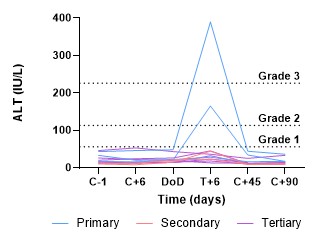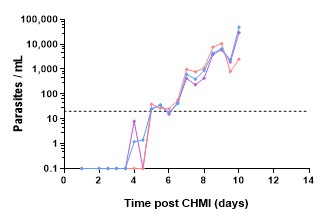VAC063C Clinical trial paper published in Frontiers in Immunology
Understanding the immune response to malaria infection by repeated infection of healthy volunteers
The Draper Lab has published the results of the first repeat blood-stage malaria challenge study. This study has been published in the Frontiers in Immunology journal, which is free to access, and can be found here.
Why we did the study:
Malaria is a major global public health problem. There were around 240 million cases of malaria and 627,000 deaths worldwide in 2020. Most of the deaths are in children under five living in Africa. There is a great need for a safe, effective malaria vaccine as well as improved malaria treatments. This is because the range of effective medicines for treating malaria is limited and commonly used medicines are becoming less effective.
In areas where malaria is common, people are often infected with malaria many times. Following repeated infections, people can develop immune responses that partially protect them from malaria.
Deliberately infecting volunteers by malaria challenge is a well-established way of testing potential new malaria vaccines and treatments. However, before the VAC063 study, no trial had infected volunteers more than once with the blood-stage of infection (via injection into the arm). Repeating malaria infection in this way may help us to better understand the development of the body’s immune responses to infection. This could provide key information to guide new vaccine and drug development.
What the study involved:
Eleven adults who took part in the VAC063C study. Six of the volunteers had never had malaria before. Five of the volunteers had previously taken part in the VAC063 study and had been infected with malaria either once or twice before.
In total, 24 adults (who had never received a malaria vaccine) took part in the VAC063 and VAC063C studies. Overall, during the two studies, 24 volunteers had a first malaria infection, 10 volunteers had a second malaria infection and six volunteers had a third malaria infection.
Volunteers were infected with malaria by injection into the arm to see whether previous malaria infection showed any evidence of providing protection against repeat infection. This was done by comparing the symptoms and blood results of the volunteers who had previously had malaria with those who had not had malaria before.
Study Aims:
1. To assess the safety of repeated malaria infections within a clinical study.
2. To look at whether previous malaria infection in a clinical study affects how fast the malaria parasite grows in the blood.
What we found:
- Having one, two or three malaria infections within a clinical study is safe.
- As with a first malaria infection, symptoms were common following second and third infection. These symptoms all resolved with treatment with no long-lasting effects.
- There was a rise in liver enzymes in some volunteers during their first malaria infection. This did not cause any symptoms and quickly got better.
- Unlike with first infection, there was no detectable rise in the liver enzymes on second and third infection.
- Antibody responses to the malaria parasite were seen after first infection and boosted on repeated infection.
- Overall, there was no clear evidence of reduced malaria parasite growth on repeated infection.
- However, three out of ten volunteers did show a reduced parasite growth rate on repeated infection, although this effect was either small or short lasting.
What this means:
- This is the first time a repeat blood-stage malaria infection study has been reported.
- There was no clear evidence of immunity to the malaria parasite on repeated infection.
- Despite this, there was some evidence that the body was starting to tolerate the presence of malaria infection. This was shown by the absence of liver enzyme changes (a marker of tissue damage). We believe this may be the start of ‘clinical immunity’ – this is when a person is protected from malaria symptoms despite the presence of malaria parasites.
- Studies like this can help us to look at how clinical immunity to malaria develops and so guide the development of better vaccines and treatments.
Overall, this study has helped us to improve our understanding of the immune response to repeated malaria infections. We are now using this information to make better malaria vaccine trials going forward. We would like to thank all our volunteers for their invaluable contribution towards this study, as without them advances like this would not be possible.
Full publication
Salkeld J, Themistocleous Y et al. Repeat controlled human malaria infection of healthy UK adults with blood-stage Plasmodium falciparum: Safety and parasite growth dynamics. Front. Immunol. 2022;13:984323. https://doi.org/10.3389/fimmu.2022.984323.




